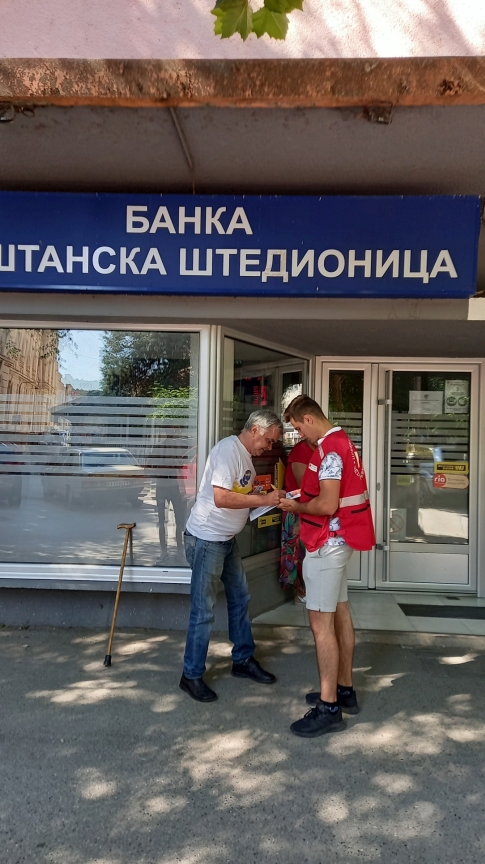- news
- distribution of financial assistance in the project „strengthening the resilience of older persons and persons with disabilities during the covid-19 crisis and future crises“
Distribution of financial assistance in the project „Strengthening the Resilience of Older Persons and Persons with Disabilities during the COVID-19 crisis and future crises“

As part of the project „Strengthening the Resilience of Older Persons and Persons with Disabilities during the COVID-19 crisis and future crises“, relief aid in the form of cash as well as food and hygiene parcels was distributed to 6,000 older persons and persons with disabilities in the countries in the Western Balkans. A total of 5,000 older persons and persons with disabilities received financial assistance with the support of the Red Cross of Serbia, the Albanian Red Cross, the Red Cross Society of Bosnia and Herzegovina, the Red Cross of the republic of North Macedonia and the Red Cross of Montenegro, and 1,000 older persons and persons with disabilities received help in the form of hygiene packages with the support of Caritas Kosova*. This project is coordinated by the Red Cross of Serbia and with the financial support of the European Union, the Austrian Development Agency and the Austrian Red Cross.
Cash assistance was chosen for several reasons. The needs of older persons and persons with disability during different crises are responded to by different actors who do not necessarily share important information with each other, which means that help can often be based on incomplete or out-of-date data. Therefore, the specific needs of older persons may remain unsatisfied because they are not recognized. Even when aid reaches them, it may happen that most of the goods that make up the humanitarian packages do not meet their needs. Only since 2018 has there been an effort to standardize humanitarian efforts targeting older persons and persons with disability which is why we currently have the “Humanitarian inclusion standards for older people and people with disabilities”. But these standards should be applied with much more rigor in all conflict situations and emergency situations around the world.
In line with this knowledge and with a view to meeting the needs of these two groups in the population that are at a higher risk in emergencies, the project provided for direct assistance to older persons and persons with disabilities in a difficult financial situation that occurred as a result of the COVID-19 pandemic. Cash distribution was chosen as the most effective form of assistance. This decision was made for several reasons. On the one hand, in many interventions of a similar type at global level, cash has proven to be the best way for people in a more difficult financial situation to meet their most urgent needs in a way that standardised packages could not. On the other hand, experience shows that generalised humanitarian aid provided in kind to older persons frequently does not meet their needs, and since it is a very diverse population, just as the population of persons with disabilities is, cash proves to be the best choice that enables each recipient to customise the aid and meet the greatest need they have. In the case of the COVID-19 crisis, it turned out that these two groups were very often in a situation where they had to pay extra out of pocket expenses for healthcare services, because many health institutions were in the COVID-19 mode of operation, so it was much harder to get regular healthcare services, or, fearing infection, these two groups decided to visit private physicians, which again increased their out of pocket expenses.
The selection criteria were made in cooperation between the Red Cross and the relevant ministries and institutions, taking care to ensure that the money goes to the beneficiaries who need it the most.
The distribution lasted from March to the end of June, and approximately 60 percent of the people reached belong to the population over the age of 65 years, while the other 40 percent come from the population of persons with disabilities. Preparations for this complex task lasted more than a year with capacity building that will facilitate future similar work in all five National Red Cross Societies, and trainings led by the Red Cross of Serbia and the Austrian Red Cross relying on the methodology of the International Federation of Red Cross Societies and Red Crescent Societies.
As part of the project, standard operating procedures were developed, and a complaints system was created through which the beneficiaries could submit their objections. During the summer months, all National Societies will carry out post-distribution monitoring in order to determine user satisfaction and take note of the feedback that will enable further improvement of the methodology for future interventions.
* This name is without prejudice to the status and is in accordance with the United Nations Security Council Resolution 1244 and the opinion of the International Court of Justice on the declaration of independence of Kosovo
